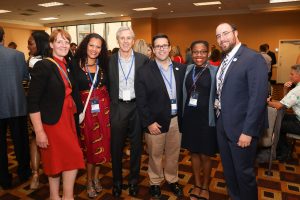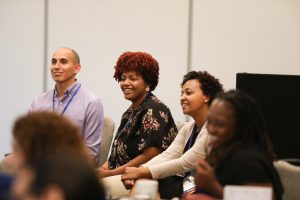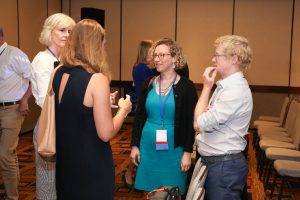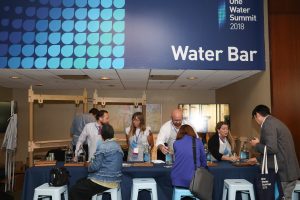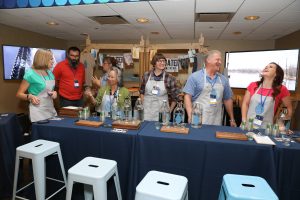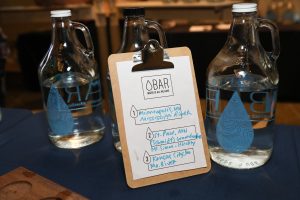Reconnecting to the Water at the One Water Summit
One Water, One Future.
That was the theme of the 2018 One Water Summit, hosted in Minneapolis by the U.S. Water Alliance from July 10-12. For the third consecutive year, Jersey Water Works led a delegation from New Jersey at the summit, and with a total of 34 delegates, this year’s was the largest delegation yet from the Garden State.
Recognizing the need for more peer-to-peer interaction among delegates, the U.S. Water Alliance established a day of delegate-specific events, including delegate-led peer exchange sessions, and institutes focused on specific water topics including equity, communications, and arts and culture. Delegates also had the opportunity to take tours to view best water practices in action in and around Minneapolis, including visits to see local green infrastructure installations, water-friendly agriculture examples, and even a visit to Target Field to learn about the water reuse technologies incorporated into the facility.
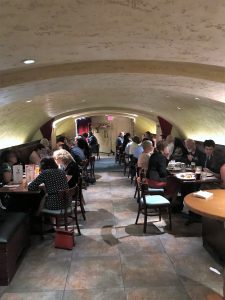
Delegates spent three days learning about the latest national trends in financing water projects, communicating water issues to different audiences, incorporating equity into water decisions, how to make utilities more innovative, and how to address affordability issues, as well as many other ideas and topics.
However, Jersey Water Works members were not just a part of the delegation, but were speakers at the conference as well. Jersey Water Works Steering Committee member Dan Kennedy and collaborative member Joan Matthews spoke on the “Finding the Money: What Cities and States are Doing” panel that addressed funding challenges and opportunities to address water infrastructure. Fellow Steering Committee member Meishka Mitchell was a panelist for the “Green Infrastructure Delivers Multiple Benefits” session.
The Geraldine R. Dodge Foundation and the Utilities and Transportation Contractors Association hosted a networking dinner for New Jersey delegates that provided a chance for representatives from utilities, environmental groups, arts organizations, and the media to share different ideas and perspectives on water and the challenges facing it in New Jersey.
After the conference, delegates reconvened on a conference call to discuss their takeaways and suggestions for ideas and resources to bring back to New Jersey. One of the things that had the biggest impact on the attendees was the idea of reconnecting people to water, in particular through the arts. Many of the exercises and discussions focused on ways to get people to reconnect with water in a very personal sense. How water is discussed and talked about can often be abstract to people who aren’t involved in water issues. Delegates discussed strategies they learned to bring the discussion around water back to the individual. Using art to make the connection between people and water can be an important tool to helping find common ground on understanding what a community’s water needs are.
Actions for Jersey Water Works
The delegation also made a commitment, presented by Nathaly Agosto-Filión at the closing plenary, that reads:
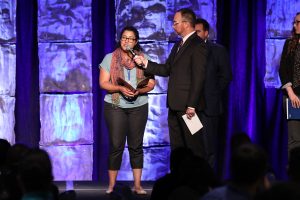
The New Jersey delegation will meet after the summit to identify at least four actions that it can take to build public and political will for better water infrastructure and water management, that gives equitable access to water services, recreation and workforce opportunities. We’ll share these actions with the full Jersey Water Works membership and propose them for inclusion in the collaborative’s 2019 work plan. Jersey Water Works’ work plan contains the projects its committees will advance to improve our state’s inadequate water infrastructure that works towards providing communities with clean water and waterways; healthier, safer neighborhoods; local jobs; flood and climate resilience; and economic growth.
While the final actions are still being discussed by delegates, the themes identified as areas for actions have to do with addressing lead in drinking water; building out the Jersey Water Works network to include more voices; connecting water messaging to arts and finding ways to incorporate the arts into existing committee work; and connecting messaging around water issues directly to potential solutions.
New Jersey Delegates
- Nathaly Agosto-Filión, Chief Sustainability Officer, City of Newark
- Christine Ballard, Vice President and Water Resources Practice Leader, T&M Associates
- Naeema Campbell, Program Associate, Geraldine R. Dodge Foundation
- Natalie Chesko, Staff Engineer, Southern Monmouth Regional Sewerage Authority
- Joseph Coviello, Director of Public Affairs, Jersey City Municipal Utilities Authority
- Chris Daggett, President and Chief Executive Officer, Geraldine R. Dodge Foundation
- Marcy DePina, Program Director, Newark Riverfront Revival
- Ed DiFiglia, Program Manager, New Jersey Future
- Rick Dovey, President, Atlantic County Utilities Authority
- Jeremy Farrell, Executive Director, Jersey City Municipal Utilities Authority
- Kim Gaddy, Environmental Justice Organizer, Clean Water Action
- Andrew Hendry, President and Chief Executive Officer, New Jersey Utilities Association*
- John Keller, Director of Education and Outreach, CoLab Arts
- Dan Kennedy, Director, Environmental and Utility Operations, Utility and Transportation Contractors Association of New Jersey*
- Bill Kibler, Director of Policy, Raritan Headwaters
- Taneshia Laird, Executive Director, Princeton Arts Council
- Wendy Liscow, Education Program Director, Geraldine R. Dodge Foundation
- Marie Mascherin, Chief Operating Officer, New Jersey Community Capital
- Mark McKoy, Vice President and General Manager, Suez
- Kenneth Miles, Author, Brick City Live
- Elizabeth Murphy, Director, Creative NJ
- Elyse Pivnick, Director of Environmental Health, Isles
- Ed Potosnak, Executive Director, New Jersey League of Conservation Voters*
- Randy Solomon, Executive Director, Sustainable Jersey*
- Vito Spadavecchia, Water Resources Department Manager, T&M Associates
- Chris Sturm, Managing Director, Policy and Water, New Jersey Future
- Mark Theiler, Assistant Superintendent, Middlesex Water Company
- Margaret Waldock, Environment Program Director, Geraldine R. Dodge Foundation*
- Kevin Whitney, Project Analyst, Atlantic County Utilities Authority
- Breana Whittaker, Principal Engineer, City of Newark Dept. of Water and Sewer Utilities
- Michael Willis, Engineering Manager, Suez
*Member of the JWW Steering Committee
